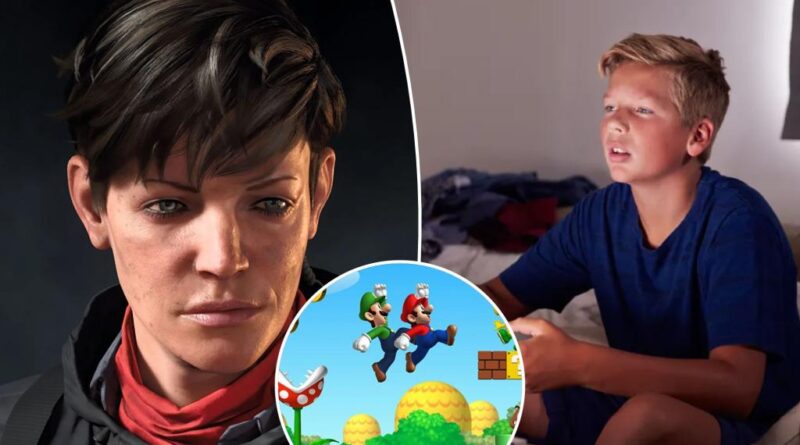Step Aside Schools: DEI Takes Center Stage in the Video Game Industry

Donald Trump has promised to eliminate as many DEI initiatives as he can when he returns to the presidency. However, there’s one area where diversity, equity, and inclusion aren’t just existing—they’re flourishing: the realm of video games.
“Call of Duty,” one of the most legendary gaming franchises, recently introduced Rossi, its inaugural nonbinary character using they/them pronouns. While some may view this as simple virtue signaling, it plays a part in a much broader narrative.
As the traditional media industry falters, gaming—a community of 212 million players in the US—has turned into the ideal stage for DEI principles to thrive.
DEI ideology initially found its roots in academia, with today’s game developers being direct products of that environment.
Earlier this year, footage emerged showing Dani Lalonders, an associate narrative designer from EA’s Seattle-based Cliffhanger Games, proudly stating her choice to exclude white individuals from her team due to their supposed “difficulties in collaboration.”
This isn’t an isolated case. For example, “Pokémon Legends: Arceus” was criticized by Vice for allegedly promoting colonialism (which it does not).
Additionally, “Super Mario Kart” has been accused of promoting “white privilege,” despite featuring Mario and Luigi as hardworking plumbers on a quest to save a princess.
With “Grand Theft Auto 6” expected to release next year, it seems likely that the game will sacrifice its edgy past for a more woke narrative.
A former employee of Rockstar Games hinted that fans may be “disappointed” by the new direction of GTA.
The trailer supports this idea,
as it primarily showcases African-American communities, a choice many long-time followers have interpreted as overt identity politics.
Some commenters expressed concern on Reddit about the significant lack of white characters and accused Rockstar Games of promoting a political agenda.
The introduction of Lucia as a Latina protagonist only escalated the criticism.
For advocates of DEI, video games present an attractive medium not just due to their expansive player demographics, but because of the substantial time young, impressionable audiences dedicate to these immersive worlds.
Approximately 25% of Americans engage in gaming for 3-7 hours a week, another 25% for 8-12 hours, and 25% spend over 13 hours weekly. Unlike television programs, gaming offers continuous, uninterrupted interaction with no commercial breaks.
Sweet Baby Inc, a significant player in the gaming world, may sound innocuous, yet the Montreal-based firm has played a crucial role in disseminating damaging ideologies within the industry.
With a focus on game writing and diversity consulting, Sweet Baby has influenced games like “God of War: Ragnarök,” “Marvel’s Spider-Man 2,” and “Alan Wake 2.”
In “Ragnarök,” their political agenda is clear, with the Norse goddess Angrboda depicted as black.
The Norse were many things, but being black was not one of them.
In contrast, the company Ubisoft—where many Sweet Baby employees previously worked—strives for accurate representation; their digital reconstruction of Notre Dame Cathedral served as an essential reference for its restoration following the 2019 fire.
The backlash against Sweet Baby has been severe; on Steam, a digital gaming platform, over 450,000 users have united behind a boycott list titled “Sweet Baby Inc. detected,” refusing to purchase any game influenced by the company’s ideologies.
Conversely, some individuals applaud this emphasis on identity. The highly anticipated “Spider-Man 2,” another Sweet Baby “success,” was commended by The Gamer for its unyielding promotion of “queerness.”
The article’s author, Jade King, described the game as “fruity,” celebrating the “prominent LGBTQ+ representation integrated throughout, from street art to smaller side quests.”
Ms. King also celebrated the bisexuality of character Black Cat, considering it a seamless fit—a seductive thief who ensnares vulnerable men, exploits them, and ultimately opts to love another woman.
Is this a video game or a low-budget adult film?
Simultaneously, the upcoming game “Dragon Age: The Veilguard” will allow players to create trans or non-binary protagonists, showcasing gaming’s unwavering drive to transform every story into a platform for identity politics.
With only 0.5% of young adults identifying as transgender, this isn’t representation; it’s a distortion of reality.
The once-meritocratic landscape of gaming is being supplanted by divisive ideologies and lackluster storytelling. Complex characters and engaging narratives have been replaced by dull avatars crafted solely to satisfy ideological standards, reducing games to a simplistic narrative of oppressors and the oppressed.
Gaming used to be a haven for creativity and adventure.
But similar to mainstream media and higher education, it has been commandeered by gatekeepers far more concerned with quotas than with quality.
Mario and Luigi are barely getting by; at this rate, the iconic brothers may soon find themselves unemployed.



